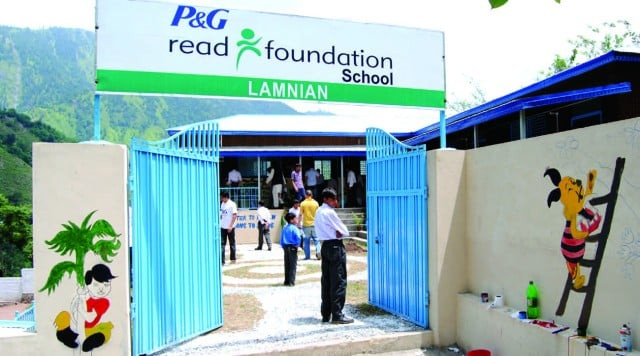Rebuilding lives

Rebuilding lives
One NGO which is striving to provide quality education to the children of AJK is the READ Foundation which is running a cohesive network of 339 schools spread over eight districts of Azad Jammu Kashmir, with branches located in Murree, Gilgit-Baltistan and the outskirts of Islamabad and Rawalpindi. The foundation has more than 7,000 orphans in its student body of 70,000 children guided by 3,277 teachers. Unfortunately, in AJK the last five years have been spent restoring resources to the level they were at before the earthquake. This also means that today there are not enough schools in the region for the increasing number of children. Considering the huge number of problems arising as a result of illiteracy and lack of attention towards orphans, the situation in AJK is disturbing to say the least.
READ’s mission is to develop society through “quality-oriented, purposeful and value-based education and capacity building.” Libraries, science and computer labs are essential parts of READ Foundation schools. Students who cannot afford to pay full fees pay half or simply as much as they can. Orphans are given free education and their siblings are also supported. Around 2,000 orphans are offered family support by READ. The foundation pays particular attention to female students and 46 per cent of all students in READ Foundation schools are girls. Teachers undergo regular training while the foundation also holds talent support programs and gives out student excellence awards regularly.
The foundation is supported by donors who help it construct the school buildings. “READ Foundation is a great partner to work with,” says P&G Brand PR leader Omeir Dawoodji. “There is no misappropriation of money.” This is why the company has helped in the construction of READ schools in Gojra, Lamnian and Bara Kahu. The READ Foundation works under the self-sufficiency model and only requires donations for the initial setup of schools. The day to day expenses of running the schools and the continual enhancement of facilities after the initial setup are covered through student fees.
Hours away from the nearest town, Lamnian is a village located at some 50 kilometres ahead of Muzaffarabad towards the Indian border. In Lamnian there is one boys’ high school, one girls’ middle school and three primary schools that are run by the government. Male students in these government schools therefore have to go to far-off areas looking for middle schools while girls have to look elsewhere for high schools.
At this remote location the READ Foundation provides education to 209 students of which 77 are orphans. The READ Foundation school in Lamnian is surrounded by hills. In June another block was added in order to accommodate more children. The new academic block at the Lamnian school has been built at an estimated cost of Rs2.2 million provided by P&G.
“The students are all very keen to learn and they are very smart. If provided opportunities, they can compete with students from big schools in the cities,” said Qasim Hasnain, a volunteer who works with the company and was a part of a group assisting the teaching staff at the inauguration of the new block. The volunteers also organised wall-painting, school decoration and team-building exercises for the students.
1,613 of 4,222 government primary schools in AJK are single-teacher schools. The fact that there is just one teacher per school in around 40 per cent of all government primary schools in the region is alarming.
“This is the best time to build more schools here. We are expecting an influx of students as those who were infants at the time of the earthquake now reach school-going age.” READ Foundation manager outreach and donor relations Sohaib Saleem says.
More schools need to be built in these areas. While READ Foundation school will have enrolment till high school by the end of this year, it alone cannot cater to the entire school-going population in Lamnian.
Published in The Express Tribune, July 18th, 2010.



















COMMENTS
Comments are moderated and generally will be posted if they are on-topic and not abusive.
For more information, please see our Comments FAQ